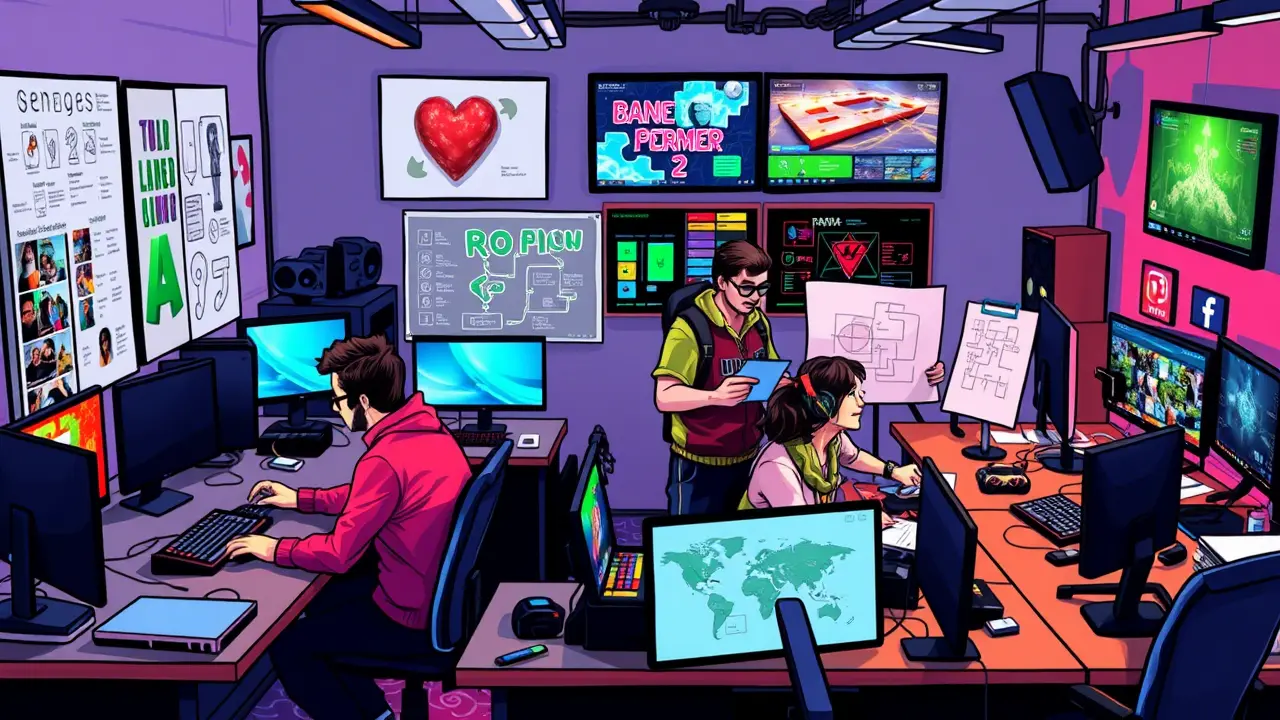The gaming industry encompasses countless specialized roles, each requiring unique skills and offering distinct career paths. From gameplay programmers who craft core mechanics to graphics engineers pushing visual boundaries, understanding these specializations helps you focus your learning and target the right opportunities. Exploring these different developer types is essential to grasp how diverse talents come together to create extraordinary gaming experiences.
Gameplay Programmer: Architect of Play
Gameplay programmers directly shape how the game feels in the player’s hands. This specialization demands a deep understanding of game mechanics and their psychological impact. In my discussions with developers from studios like Arkane or Dontnod, this passion for “game feel” comes up constantly.
These developers build combat systems, progression mechanics, and player-environment interactions. Their work directly affects the player’s sense of fun and engagement. For instance, a poorly programmed jump system can ruin the entire experience of a platformer.
Close collaboration with game designers is crucial. Turning a conceptual idea into functional code requires constant back-and-forth and strong adaptability. The best gameplay programmers often propose technical improvements that enrich the original design.
This specialization is ideal for developers passionate about crafting memorable experiences. If you instinctively analyze how games work while you play them, this path may be a perfect fit.
Graphics Programmer: Pushing Visual Boundaries
Graphics programmers work close to the hardware to squeeze out maximum visual performance. This demanding technical specialization requires a deep grasp of 3D mathematics and graphics card architecture.
These experts develop custom shaders, optimize rendering pipelines, and implement the latest lighting techniques. Their work allows artists to bring their most ambitious creative visions to life. The spectacular effects you see in AAA games often come from their ingenuity.
Constant advances in graphics technology make this a highly stimulating field. Real-time ray tracing, machine-learning upscaling, and volumetric rendering are continuously expanding creative possibilities.
This path attracts mathematically-minded people fascinated by technical detail. If you enjoy figuring out how graphics engines work “under the hood,” this specialization offers constant challenges and significant recognition.
Artificial Intelligence: Bringing Virtual Characters to Life
AI programmers design the behaviors of non-player characters and emergent systems. This discipline blends theoretical computer science with creative problem-solving to produce convincing interactive experiences.
These developers build pathfinding systems, complex behavior trees, and machine-learning algorithms. Their work breathes life into virtual worlds, turning animated mannequins into believable characters.
The rise of machine learning is revolutionizing this specialization, enabling more nuanced and adaptive behaviors. This opens up entirely new creative opportunities.
This career path appeals to developers interested in psychology and cognitive science. Understanding how to simulate intelligence requires a fascinating multidisciplinary approach beyond pure technical skills.
Tools Programmer: Powering Creative Efficiency
Tools programmers build the internal software used by the entire development team. Though sometimes overlooked, this specialization directly impacts a studio’s overall productivity and the final quality of its games.
These developers create level editors, asset import systems, and build automation tools. Their often “invisible” work allows other disciplines to focus on their own expertise. A well-designed asset pipeline can cut production time in half.
This role requires a broad understanding of all game development professions. Anticipating the needs of artists, designers, and fellow programmers demands a global vision of the creative process.
This specialization suits developers who love solving practical problems and measuring the impact of their work. Seeing an entire team work more efficiently thanks to your tools is uniquely rewarding.
Mobile Game Developer: Mastering Unique Constraints
Mobile development comes with specific technical challenges that make it a specialization in its own right. Optimizing for varied hardware, managing battery life, and designing for touch interfaces require dedicated expertise.
These developers know the ins and outs of iOS and Android, understand performance issues on limited hardware, and are familiar with engagement patterns in mobile gaming. The mobile market now represents more than half of worldwide gaming revenue.
The business model strongly influences this specialization. Free-to-play, in-app purchases, and advertising integration transform how games are conceived. Understanding these models is as crucial as pure technical skills.
This path attracts pragmatic developers interested in making games accessible to a vast audience. Creating experiences that reach millions of casual players has a significant social impact.
VR/AR Developer: Pioneering New Dimensions
Virtual reality and augmented reality represent the future of interactive entertainment. These emerging technologies demand a complete rethink of traditional development paradigms.
VR/AR developers manage the specific challenges of immersive environments: minimal latency, precise tracking, and user comfort. Preventing motion sickness while creating spectacular experiences is a constant technical challenge.
Hardware has a huge influence on this specialization. Each headset comes with its own constraints and optimization requirements. This technological fragmentation complicates development but creates lucrative niches.
This path attracts early adopters and tech visionaries. Contributing to the definition of future gaming standards represents a unique, historic opportunity.
Audio Programmer: Immersion Through Sound
Audio programming is a highly specialized, often overlooked technical field. These developers implement 3D audio, real-time synthesis, and adaptive music systems that deepen immersion.
This discipline combines acoustics, computer science, and musical creativity. Understanding how the human brain perceives spatial sound allows you to design breathtakingly immersive effects. A solid audio system can completely transform the gaming experience.
Emerging technologies like spatial audio or neural synthesis are currently revolutionizing this field, opening up new creative possibilities for composers and sound designers.
UI/UX Developer: Bridging Player and Game
Game-focused UI/UX developers understand the unique aspects of interactive interfaces. Designing effective controls for gamepads, mice, or touchscreens requires specialized knowledge.
This role blends front-end development with game design principles. Optimizing user flow, ensuring readability across multiple screens, and maintaining immersion are constant challenges.
Choosing a Specialization Based on Personality
Your personality will naturally guide you toward certain specializations. Creative profiles often gravitate toward gameplay or audio, mathematically-minded individuals toward graphics, and pragmatic thinkers toward tools or mobile.
Test out different domains through personal projects before fully committing to one. This exploration prevents poor choices and enriches your overall perspective on game development.
Conclusion
Every specialization makes a unique contribution to the magic of video games. The most important thing is to choose a path that fits your passions and natural abilities.
Once you’ve chosen your specialization, investing in education and training that aligns with your career goals will give you the strong foundations you need to excel in your chosen field.
interface sounds OGG
interface sounds, UI sound effects, UX sound effects, game UI sounds, mobile UI audio, notification sound effects, button click SFX, menu sounds, toggle switch sounds, error alert sounds
Ultimate Mobile Controls – Plug & Play
Take your mobile game to the next level with this ready-to-use Mobile Controls Pack. customizable mobile controls without wasting days on UI and input setup. Perfect for 2D, 3D, FPS, RPG, Platformer, Shooter, and Casual mobile games.

Brain Song 2025 Gamma
Cognitive Enhancement or Just Hype? Reviews The Brain Song (Killer NEW Memory Offer)

Gaming Keyboard and Mouse and Mouse pad and Gaming Headset, Wired LED RGB Backlight Bundle
Gaming Keyboard and Mouse and Mouse pad and Gaming Headset, Wired LED RGB Backlight Bundle for PC Gamers and Xbox and PS4 Users - 4 in 1 Edition Hornet RX-250

